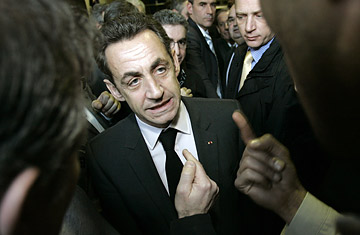
France's President Nicolas Sarkozy argues with taxi drivers at the Montparnasse train station in Paris, February 8, 2008.
Though beautiful while it lasted, French President Nicolas Sarkozy's honeymoon with a formerly adoring French public that elected him just eight months ago has definitely come to an end. The only question is what deserves the most credit for his precipitous drop in the polls: disappointment in his policies and plans for economic reform, or growing disenchantment with his tabloid-friendly love life.
The press's relentless fascination with his courtship and marriage on Feb. 2 to former top model Carla Bruni appears finally to be getting under Sarkozy's skin. On Thursday he filed criminal fraud charges against the left-leaning newsweekly Nouvel Observateur for an online article it ran on Wednesday asserting that just a week before his wedding Sarkozy tried to make up with his ex-wife Ccilia — allegedly sending her a text message imploring, "If you come back, I'll call everything off."
Yet it's the political fallout that has Sarkozy's conservative allies more worried. With nationwide municipal elections just five weeks away, conservative candidates fear a possible leftist rout in cities across France, as voters signal their displeasure with Sarkozy's national leadership.
Signs of Sarkozy's falling fortunes were starkly apparent on Thursday, when three of the nation's newsweeklies hit kiosks with critical Sarkozy-focused cover stories. The cover line on L'Express was "The Disappointment"; Le Point detailed "What's Going Wrong" and the Nouvel Observateur called him "The President Who Went Pffffftt." New polls show his approval rating has dropped from a high of 65% last July to 41% this month. That low matches the February 1996 score of former President Jacques Chirac, following a bitter three-week national strike that derailed a proposed pension reform — and led to the left's return to power the following year. Pollsters ascribe Sarkozy's descent to the defection of older, traditionally conservative voters resentful of his high-profile love life and unabashed materialism, and to still undelivered promises to rev up France's sputtering economy.
For days, the French dailies been reporting the discontent among members of Sarkozy's conservative Union for a Popular Majority (UMP) party, who complain of negative feedback from voters about the President ahead of municipal polling in March. Others also complain that advisers in Sarkozy's omnipotent Elyse now regularly make policy announcements normally reserved for government cabinet ministers. The growing criticism from inside his own government prompted a reported outburst by Sarkozy at Wednesday's weekly cabinet meeting. "I listen, I read, I hear everything that's said. After the municipal elections I will take, with sang-froid, the necessary decisions," Sarkozy said, according to Le Figaro. That was widely interpreted as an implicit threat to ministers who had been complaining to the press that they'd be removed once the municipal elections are over.
But his problems go beyond internecine rivalries and bad polls. As he met with his cabinet, thousands of taxi drivers were protesting proposed deregulation of their profession, creating mammoth traffic jams in cities across France — another in a series of strikes Sarkozy's wider reform drive has faced since October. The cabbies were part of a backlash against the economic proposals contained in a study by an expert panel commissioned by Sarkozy to find ways of stimulating economic growth. The commission is headed by Jacques Attali — a former adviser to late Socialist President Franois Mitterrand who backs Sarkozy's effort to shake up France — and its report enraged small businesses like taxi drivers, pharmacist and convenience store operators, who warn the deregulation proposals will seriously undermine their livelihoods. Still, Sarkozy has said he wants to implement almost all 316 proposals in the so-called Attali report in future reform.
Conservative legislators and mayoral candidates worry that the small-business owners most affected by the proposed reforms — historically stalwart UMP voters — are likely to join the rising tide of displeasure at the municipal polls next month. That prospect of appears to have caused Sarkozy to blink; on Wednesday, leaders of protesting taxi drivers were called to the Elyse and assured the deregulation plans had been shelved. And despite Sarkozy's avowal in December that state "coffers are empty," the presidency also announced new handouts for retirees receiving minimal pensions — a demographic pollsters count among the largest defectors in Sarkozy's approval slide. Whether all that is enough to protect conservatives from an election mauling will be seen in March.
